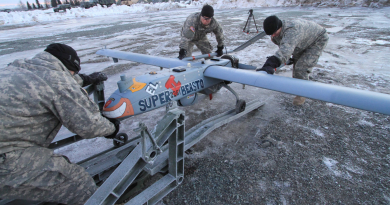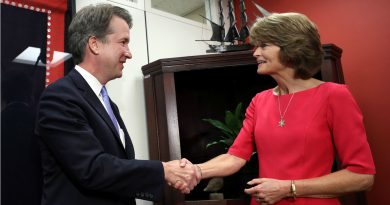Analysis: Alaska oil tax debate, are industry threats any different this time?
 At a recent state Senate Resources Committee hearing, BP Alaska’s chief financial officer sat in front of a handful of Alaska state senators, urging them to lower taxes in order to increase production and stem the decline of oil being produced on Alaska’s North Slope.
At a recent state Senate Resources Committee hearing, BP Alaska’s chief financial officer sat in front of a handful of Alaska state senators, urging them to lower taxes in order to increase production and stem the decline of oil being produced on Alaska’s North Slope.
Governor Sean Parnell has been pushing a bill to do just that. The bill would provide about $2 billion a year in tax breaks to the oil industry.
In turn, the companies have said they’re willing to invest as much as $5 billion to extract 90,000 additional barrels of oil a day.
If they produce that much, if the current tax structure stays in place and if oil prices remain at about $100 a barrel, they’ll be able to repay that investment in less than three years.
The Alaska Senate has thus far been resistant. It has its own bill which, although details are being worked out, would provide fewer tax breaks.
The governor, along with various pro-industry groups, have said the Senate bill doesn’t go far enough.
Questions raised
But how much is too much? How far is far enough? Those are questions that have vexed Alaska politicians since the dance with oil industry began after the 1968 Prudhoe Bay discovery. Since then, Alaska has wrestled with how much to charge the oil companies to extract oil owned by the state.
Where is the sweet spot? the senators asked Claire Fitzpatrick, BP Alaska’s chief financial officer. Trying to get her to be specific, Sen. Hollis French asked if there ever was a time when Alaska got its oil taxes right? Was there ever a time when Alaska was competitive enough?
Her answer seemed to surprise the group. She told the committee that yes, there was a time. In fact, in the past, there was “probably a time when you were more attractive than you needed to be,” she said. However, now, she said, “we’ve gone the other way.”
More attractive than it needed to be?
That would have been valuable for those who fought industry over taxes through the years to know. The fact is that since 1968, the industry has been telling Alaska to keep taxes low. Any change in Alaska’s tax structure that increased taxes would result in grave consequences, including fewer jobs and less production.
Looking back
In 1989, as oil lapped up on the shores of Prince William Sound, the Legislature was gearing up for battle. Back then, the state had a system of oil taxes called the Economic Limit Factor, or ELF for short. In was enacted in 1977, but in 1981, the Legislature re-wrote the system, promising that oil production taxes would decrease as the pools of oil in particular fields decreased. Those fields included Prudhoe Bay and Kuparuk, the first-and second-largest onshore producing oil fields in the United States.
The 1989 fight was over about $150 million, equal to about 20 cents a barrel then.
Sen. Ed Dankworth wrote that bill. Soon after Dankworth left the legislature, he became an oil industry lobbyist. One of his main clients was oil field services company VECO, which was owned by Bill Allen. The same Allen was caught bribing Alaska legislators in 2005 and 2006 to keep oil industry taxes low for what he called “the big boys” BP, ExxonMobil Corp., and ConocoPhillips. He worked to pass bills in their favor, and to kill bills they didn’t like so, in his words, they “won’t have their fingerprints” on them.
The fight then might have been won by the oil companies and their friends had Exxon Valdez not happened. Still, it was brutal. Newspaper ads warned of how other regimes were more competitive than Alaska. Oil production will decline, they said, many jobs will be lost. The specifics were murky, but it would happen, industry warned.
“The short-term fix,” Arco vice president Hugh Motley said at the time, “will result in a long-term detriment to the individual citizen of Alaska.”
After the vote, Arco and BP reacted swiftly, suspending more than $140 million in new North Slope projects. Within a year, however, BP resumed its projects. Arco waited longer, reviving its canceled projects in 1996.
Another fight involved Wally Hickel in 1994 when he was governor. Hickel’s bill proposed that the Legislature extend the statue of limitations to collect back taxes owed by the industry for overstating how much it cost to transport oil down the pipeline. Those costs could be written off the companies’ tax bills.
The same threats. The same arm twisting. This time, the vote went the way of industry.
“(T)oo many Alaskans just can’t get it out of their heads that if we don’t defer to the oil industry, they’ll abandon us,” Anchorage Daily News editorial page editor Michael Carey wrote at the time.
“The refrain ‘give the oil companies what they want or they’ll leave’ is so embedded in our culture that it’s easy to believe Alaskans will hear echoes of it 100 years from now when Prudhoe has been sucked dry. Except in 2094, when the great-grandchildren of the current crop of lawmakers gather in Juneau (or maybe Willow), the pro-industry line will be, ‘We better not raise taxes — if we do, the oil industry won’t come back.'”
ACES (Alaska’s Clear and Equitable Share) — the tax bill being debated today — was passed after former Gov. Frank Murkowski’s bill became law in 2006. Murkowski’s bill was being discussed by Bill Allen, who had taken over for Dankworth, and state legislators in the Juneau.
Unfortunately for them, some of those discussions were being taped by the FBI. It was the bill that led to raids, ruined careers, tarnished reputations, and fueled the rise of Sarah Palin. Palin was able to use all the drama — including a public courtroom scene where the voice of then-ConocoPhillips Alaska President Jim Bowles orders Allen to make sure to get a bill killed that proposed higher taxes than the company wanted to pay.
Time to ‘move on’
In November, Bruce Tangeman, Deputy Commissioner for Alaska’s Department of Revenue, said that it’s time for Alaskans to “move on” and stop focusing on what happened five years ago. “If the goal is to punish these companies,” he said, “mission accomplished.”
Perhaps the mission has been accomplished, and oil taxes are too high. Perhaps this time, it’s more than a game of chicken. Perhaps this time, they really will leave if things don’t change, even though billions and billions of dollars worth of oil remain in the ground.
But given what industry has told Alaska in the past, how can Alaska politicians be sure?
The governor seems sure, once the director of government relations in Alaska for ConocoPhillips, he says he believes what industry tells him.
Juneau Mayor Bruce Botehlo served as Alaska state attorney general for governors Wally Hickel and Tony Knowles. He’s watched the the oil industry dance for years now. He’s not as sure as Parnell.
“The industry’s view is to never to pay a dollar more than it believes that it should be charged,” said. Hickel, among others, felt that the state should also fight for every dollar the state should get.
After years of watching the industry and Alaska haggle over this issue, one thing he can say for sure is that the companies will “seldom find a taxing regime in this state that’s good enough for them,” he said.
Even, apparently, when the state is being more generous that it needs to be.
Contact Amanda Coyne at Amanda@alaskadispatch.com
For more stories from Alaska Dispatch, click here.



